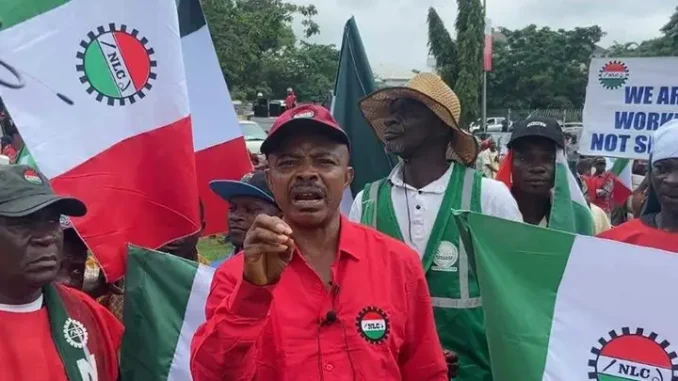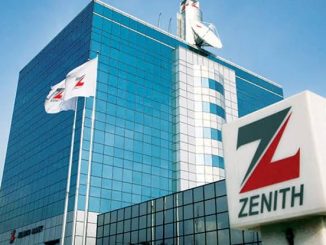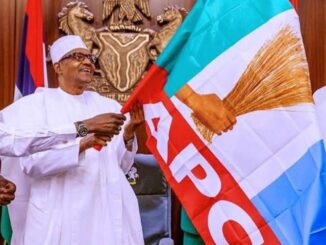
By Marvellous Nyang
June 3, 2024
The Transmission Company of Nigeria (TCN) has attributed the national blackout to labour unions as the strike commenced on Monday, grounding activities across various sectors of Nigeria’s economy.
TCN in a statement said union workers stormed the national grid, leading to the shutdown of the nation’s power supply, plunging tens of millions into darkness.
Additionally, the strike has brought air travel to a standstill, disrupting flights and leaving travellers stranded.
The Nigerian Labour Congress (NLC) and the Trade Union Congress (TUC) initiated the indefinite strike, exacerbating the nationwide disruptions over unresolved minimum wage issues with the Federal Government.
TCN leaders alleged that its operators were beaten and injured while they were forcibly removed from control rooms.
Cane-swinging union workers were also seen in photos circulating on social media Monday ordering personnel of the country’s tax agency out of their offices.
This strike comes after failed negotiations with the government to raise the federal minimum wage.
The unions are also protesting a recent hike in electricity tariffs.
ALSO READ: Nigerian lawmakers push to curb central bank’s role in economic policy amid soaring inflation
The unions’ demands include raising the minimum wage from 30,000 naira ($22.4) to 494,000 naira ($369.6).
Presidential aide Bayo Onanuga dismissed these demands as “unreasonable,” in a post on the social media platform X.
The government had proposed a 100% increase to 60,000 naira ($44.89), which the unions rejected, seeking a 1,547% increase instead, Onanuga added.
Despite being Africa’s fourth-largest economy, Nigeria’s minimum wage is not among the continent’s top ten, lagging far behind countries like Seychelles, where workers receive a minimum wage of $465.4 monthly.
Health care system disrupted
The strike has severely affected travel, leaving passengers stranded at major airports in Lagos and Abuja. Airport workers confirmed to CNN that all incoming and outgoing flights have been grounded, further compounding the crisis.
Healthcare services have also been severely impacted, a Nigerian doctor Olusina Ajidahun told CNN.
“I’m worried because the state of the healthcare system is on the verge of collapse,” he said, adding that his medical facility located in southwest Nigeria was unable to power crucial hospital equipment due to the shutdown of the national grid.
“Coming in the morning, the emergency (unit) and everywhere was dark. Patients and healthcare workers were all in darkness.”
Nigerian Justice Minister Lateef Fagbemi has declared the strike illegal in a letter to the labor unions, calling it “premature and ineffectual,” in a statement posted by Onanuga.
The strike has elicited mixed reactions from Nigerians on social media, with some declaring support, others saying it is detrimental to citizens.
“I support the strike action by the NLC. 30k or 60k minimum wage in 2024 Nigeria is unsustainable and unacceptable,” wrote lawyer Festus Ogun in a post on X.
“The NLC should refrain from actions that punish the common man – the average Nigerian. Electricity, roads, airports and other critical infrastructure should be left to function as normal,” argued management consultant Dipo Awojide.
Controversial expenditure
Nigeria faces numerous economic challenges, including the devaluation of its currency which has dropped to record lows in recent months, as well as a cost-of-living crisis marked by soaring prices for food, transport, and health care. Inflation has reached 33.69%, according to the country’s data office, the highest in nearly three decades.
President Bola Tinubu’s administration has faced criticism for controversial spending of public funds which has fueled public anger.
Last month, the president approved a 90 billion-naira ($67 million) subsidy for Muslims attending the Hajj pilgrimage, and previously, he authorized multimillion-dollar budgets for luxury SUVs and renovations for presidential residences, as well as vehicles for the First Lady’s office, which is not formally recognized under Nigerian law.
Presidential spokesman Ajuri Ngelale admitted that the current wage is “unsustainably low” but warned that the unions’ proposed increase would have severe economic consequences, including significantly higher school fees and potential mass retrenchment if schools and other institutions cannot afford the increased wages.
“Nigerian parents will now have to grapple with school fees that are 10 times more than what they are paying today … you are going to mandate schools to pay cooks, janitors, and others 20 times more in wages?” he said.




